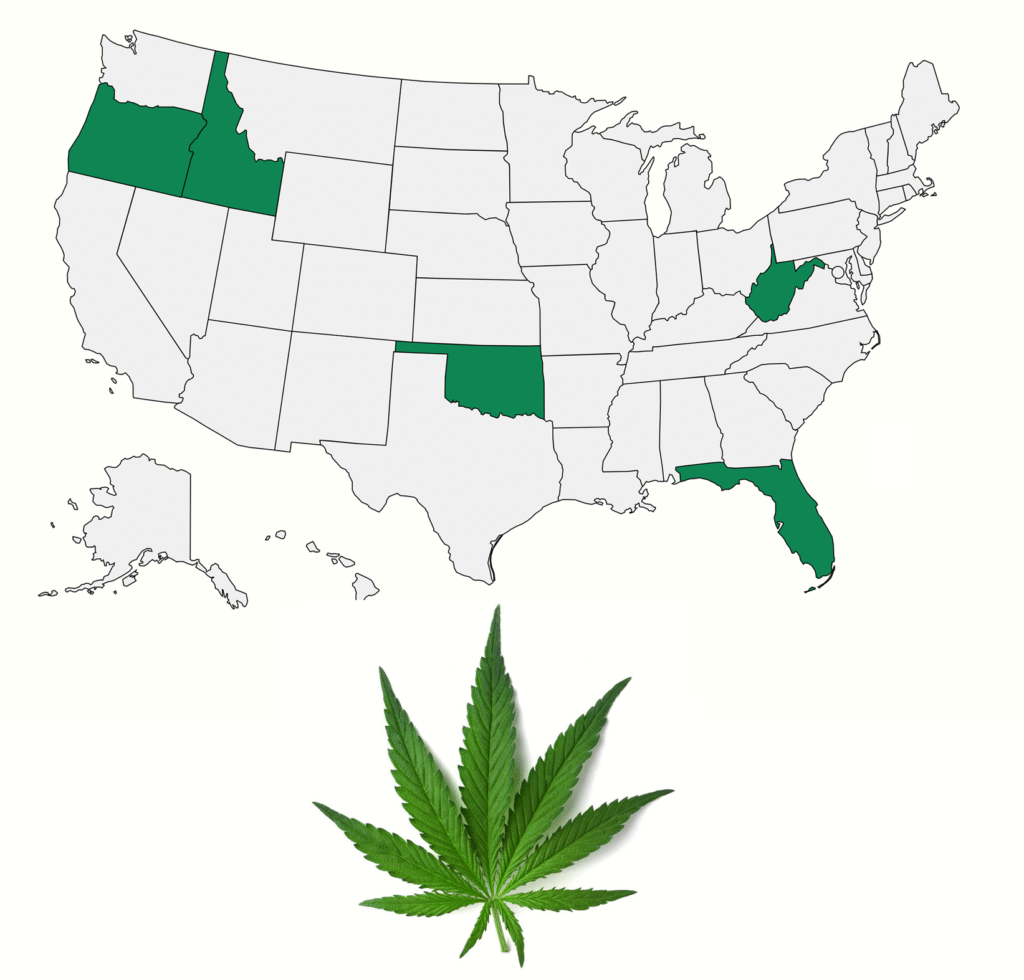As support for marijuana reform continues to grow nationwide, advocates in five states are working to put legalization or decriminalization measures before voters in 2026.

Efforts in Florida, Idaho, Oklahoma, West Virginia and Oregon vary in scope, from full legalization of recreational use to creating public consumption spaces and blocking further reforms.
Oregon
In Oregon, a group called the Oregon Cannabis Cafe Coalition is collecting signatures for a 2026 initiative that would legalize cannabis cafes. These venues would allow on-site marijuana consumption and be permitted to serve food and non-alcoholic drinks. The initiative aims to establish a statewide licensing system for public use lounges and, eventually, infused edibles.
If successful, Oregon would become one of just a few states to allow regulated, indoor cannabis consumption in a social setting.
Idaho
In Idaho, the nonprofit organization King Idaho is pushing a citizen initiative that would decriminalize the possession, use and cultivation of marijuana for adults. The measure would make personal marijuana offenses the lowest law enforcement priority statewide, with proponents aiming to put it to a vote in November 2026.
At the same time, the Idaho Legislature has placed House Joint Resolution 4 on the 2026 ballot. If approved by voters, it would block future legalization efforts from going through the ballot initiative process and reserve that power solely for the legislature.
West Virginia
In February, lawmakers in West Virginia filed House Joint Resolution 27, which would let voters decide on marijuana legalization. The resolution would amend the state constitution to legalize the possession of up to two ounces and allow home cultivation of up to four plants for adults 21 and older.
It would also give the legislature the authority to regulate sales and manufacturing, and allow individuals with past low-level marijuana convictions to petition for expungement. The resolution is currently in the House Judiciary Committee.
Oklahoma
In Oklahoma, a new recreational marijuana legalization initiative is moving toward a signature drive that could begin as soon as August 15. The proposal, known as State Question 837, is backed by Oklahomans for Responsible Cannabis Action (ORCA), who say they are prepared to begin collecting signatures unless a legal challenge delays the process until fall.
Filed earlier this year, the initiative would legalize marijuana for adults 21 and older and allow them to possess up to eight ounces of flower, one ounce of concentrate, and grow up to 12 plants for personal use. It also allows the legal possession of any marijuana harvested from those plants.
Unlike past proposals, SQ 837 includes sweeping protections in areas such as housing, employment, healthcare access, parental rights, public benefits, driving privileges, and firearm ownership. According to ORCA spokesperson Jed Green, the measure is currently in a public challenge period that runs through July 7.
If cleared, the group will have a 90-day window to gather 172,993 valid signatures to qualify for the November 2026 ballot. The measure would also impose a 10% excise tax on recreational sales, with revenues split among the state’s general fund (40%), counties (30%), and cities where sales take place (30%).
Organizers say the 2025 legislative session is now behind them, allowing them to fully focus on the campaign throughout the rest of the year.
Florida
In Florida, Smart & Safe Florida is once again leading the charge to legalize marijuana for all adults 21 and older. The group was behind Amendment 3, which received 56% of the vote in 2024—just shy of the 60% needed to pass.
For 2026, the group has launched a fresh petition campaign and has already gathered over 218,000 valid signatures, about a quarter of the 891,523 required by the February deadline. Their new proposal is nearly identical to the last, allowing for personal use, licensed sales, and dual-use dispensaries. Public use would be banned, and marijuana could not be sold in businesses that also serve alcohol.
At the same time, Smart & Safe Florida is challenging a new state law that imposes tougher restrictions on citizen initiatives, including reduced deadlines and increased financial penalties. They argue the changes are unconstitutional.







